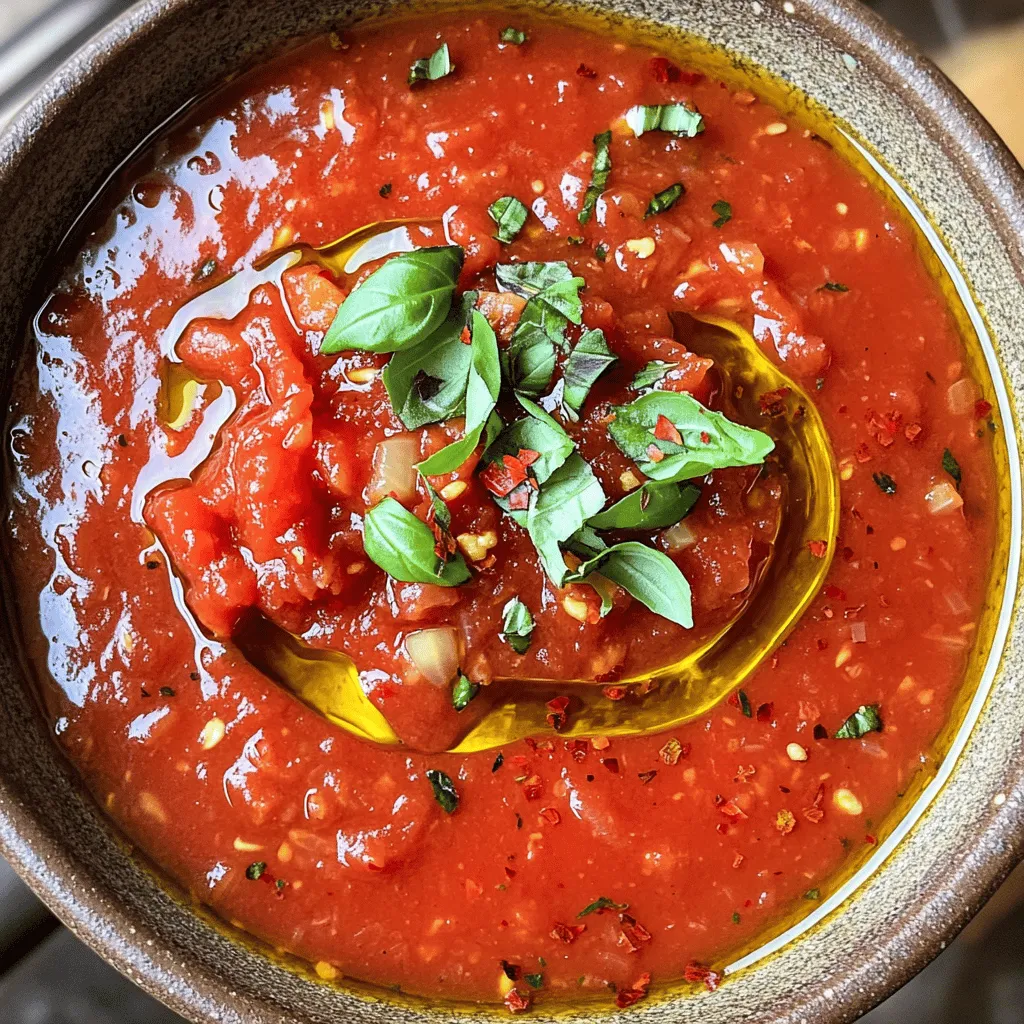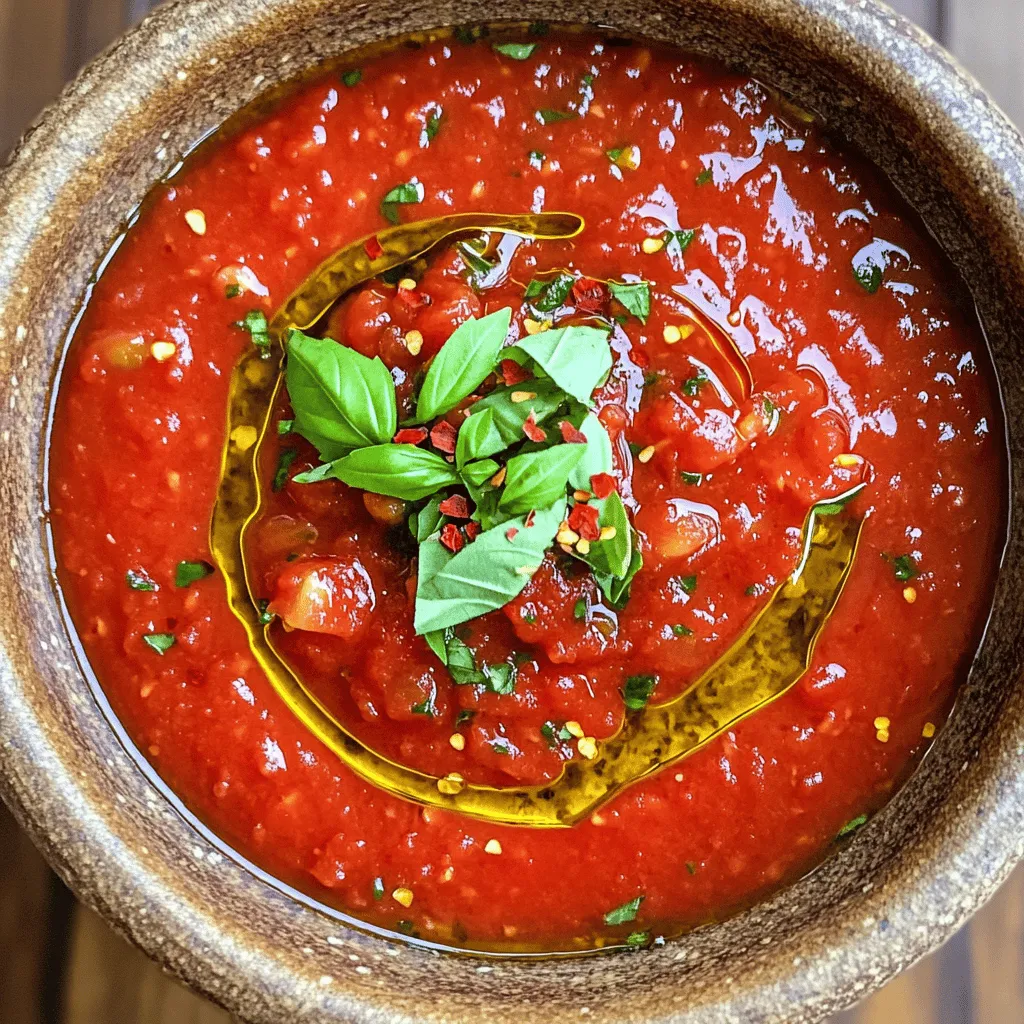Are you ready to elevate your cooking game? Fresh marinara sauce brings bright flavors and a homemade touch to any dish. In this simple and tasty recipe, I’ll guide you from selecting the best ingredients to storing your sauce perfectly. Whether you want a classic flavor or a spicy kick, you’ll learn tips and tricks to impress everyone at the table. Let’s dive into the world of fresh marinara!
Ingredients
Key Ingredients for Fresh Marinara Sauce
– Fresh tomatoes: I love using Roma or vine-ripened tomatoes. They have great flavor and texture. Look for tomatoes that feel heavy and firm. They should smell sweet and earthy. This ensures your sauce tastes fresh and rich.
– Additional aromatics and spices: Onions and garlic are key players in this sauce. They add depth and warmth. I prefer using yellow onions for their sweetness. Fresh basil is a must at the end. It brightens the sauce and gives it a lovely aroma. Don’t forget to add salt and pepper to enhance all the flavors.
– Optional add-ins for enhanced flavor: You can spice things up with red pepper flakes for heat. If the sauce is too acidic, a tablespoon of sugar helps balance it. Feel free to get creative! Adding a splash of red wine can add complexity. You can even toss in some olives or capers for a briny twist.
For the full recipe, check out the Classic Fresh Marinara Sauce. This dish is simple yet bursting with flavor!
Step-by-Step Instructions
Preparing the Tomatoes for Sauce
To start, you need ripe tomatoes. I prefer Roma or vine-ripened tomatoes. First, bring a large pot of water to a boil.
– Carefully score the bottom of each tomato with a small ‘X.’
– Lower the tomatoes into the boiling water for 30 seconds.
– Move the tomatoes to a bowl of ice water to stop cooking.
Once they cool, peel off the skins. You can chop them roughly. If you want a smooth sauce, remove the seeds. For a chunkier sauce, leave them in.
Cooking the Base
Next, we will cook the base. Heat 1/4 cup of extra-virgin olive oil in a large skillet over medium heat.
Add the finely chopped onion. Sauté it for about 5 to 7 minutes. You want it translucent and soft.
Then, add 4 cloves of minced garlic and 1/2 teaspoon of red pepper flakes if you like heat. Cook for 1 to 2 minutes. This brings out a strong aroma, but make sure not to burn the garlic.
Simmering to Perfection
Now it’s time to combine everything. Add the prepared chopped tomatoes to the skillet. Stir well to mix with the onion and garlic.
Bring the sauce to a gentle simmer. This allows the flavors to come together.
Next, season with 1 teaspoon of dried oregano, salt, and freshly cracked black pepper. If your tomatoes are too acidic, add 1 tablespoon of sugar.
Let the sauce simmer uncovered for about 20 to 30 minutes. Stir occasionally. This helps it thicken. You can cook it longer if you like a richer flavor.
In the last few minutes, fold in freshly chopped basil. Taste your sauce and adjust the seasoning. This is your chance to make it just right!
For the full recipe, you can refer to the beginning of the article.
Tips & Tricks
Perfecting the Flavor
Seasoning is key to a great marinara sauce. Always taste as you cook. This lets you adjust flavors to your liking. Add salt little by little. Fresh tomatoes can vary in taste, so don’t be afraid to tweak it.
Acidity can be a tricky part of tomato sauce. If your sauce tastes too sour, sugar helps balance it out. Just one tablespoon can make a big difference. Start with a small amount and add more if needed.
Presentation Ideas
When it comes to serving, pasta is a perfect match for marinara sauce. Pour the sauce over cooked spaghetti or penne. It clings nicely to the pasta, making each bite flavorful.
Garnishing adds a touch of beauty. Fresh basil leaves not only taste great but also look vibrant on the plate. A sprinkle of grated Parmesan cheese enhances the flavor too. You can also serve it with warm, crusty bread for dipping. That adds a fun element to your meal.
For a full recipe, check out the details above. Enjoy crafting your fresh marinara sauce!

Variations
Classic vs. Spicy Marinara
You can easily adjust the heat in your marinara sauce. To make it spicy, add more red pepper flakes. Start with a pinch and taste as you go. If you want a milder sauce, skip the red pepper flakes or use just a small amount.
Consider using different herbs to change the flavor. Oregano is classic, but thyme and parsley work well too. Fresh herbs give a brighter taste. Dried herbs are good but use them sparingly.
Fresh Variations Using Other Vegetables
You can add more veggies to your marinara for extra flavor. Try bell peppers for sweetness. Dice them small and sauté them with the onions. Mushrooms also add a rich taste. Slice them and cook until soft before adding tomatoes.
Seasonal vegetables can enhance your sauce. In summer, add zucchini or eggplant. In fall, try butternut squash. Each vegetable brings a new twist to your marinara. This keeps your dish fresh and interesting.
For the full recipe, check out the Classic Fresh Marinara Sauce section.
Storage Info
Best Practices for Storing Marinara Sauce
To keep your marinara sauce fresh, cool it first. Let it sit at room temperature for about 30 minutes. This helps prevent condensation in your storage container. Once cooled, you can store it in the right containers.
– Use airtight glass jars or BPA-free plastic containers.
– Leave some space at the top of your container. The sauce may expand when frozen.
Freezing Fresh Marinara Sauce
Freezing marinara sauce is a great way to save it for later. Use freezer-safe containers or bags. Pour the cooled sauce into them and seal tightly. Label them with the date. This helps you track how long it has been frozen.
– For long-term storage, use freezer bags to save space.
– When ready to use, thaw the sauce in the fridge overnight.
For best results, reheat the sauce slowly on the stove. Stir it often to keep it smooth. Enjoy your homemade sauce anytime! For the full recipe, refer back to the Classic Fresh Marinara Sauce section.
FAQs
Can I use canned tomatoes for marinara sauce?
Yes, you can use canned tomatoes. They are often more convenient and consistent.
Pros of canned tomatoes:
– Year-round availability
– Usually peeled and ready to use
– Often have a rich flavor
Cons of canned tomatoes:
– May lack the brightness of fresh
– Can have added preservatives or salt
Fresh tomatoes shine in flavor, but canned can work well, too. Choose what suits you best.
How long can I store homemade marinara sauce?
Homemade marinara sauce lasts up to 5 days in the fridge. Store it in an airtight container. For longer storage, freeze the sauce.
Freezer shelf life:
– Up to 3 months in a freezer-safe container
– Make sure to leave space for expansion
Always label your containers with the date. This helps keep track of freshness.
What dishes can I use fresh marinara sauce with?
Fresh marinara sauce is versatile. It pairs well with many dishes.
Popular options:
– Spaghetti or any pasta
– Pizza as a base sauce
– Meatballs for a classic combo
– Ratatouille for a veggie boost
Feel free to get creative! Marinara can enhance many meals.
Full Recipe for Classic Fresh Marinara Sauce
For a quick reference, here’s the full recipe:
– 2 lbs ripe tomatoes, preferably Roma or vine-ripened
– 4 cloves garlic, minced
– 1 medium onion, finely chopped
– 1/4 cup extra-virgin olive oil
– 1 teaspoon dried oregano
– 1/2 teaspoon red pepper flakes (optional for heat)
– Fresh basil leaves, roughly chopped (about 1/2 cup)
– Salt, to taste
– Freshly cracked black pepper, to taste
– 1 tablespoon sugar (optional, to balance acidity)
Follow the full recipe to make this wonderful sauce! Enjoy!
Making fresh marinara sauce is fun and tasty. We discussed key ingredients like fresh tomatoes, spices, and optional add-ins. I shared step-by-step instructions for preparing, cooking, and simmering. Helpful tips showed how to perfect flavor and present your dish beautifully.
You can explore various marinara types by adjusting spice levels or adding vegetables. Remember to store sauce properly for lasting freshness. Overall, making your own marinara sauce enhances any meal. Enjoy the process and savor the rich flavors you create!




